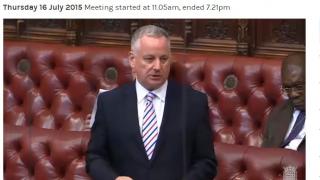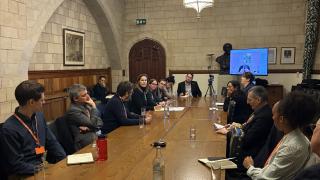
Members of the House of Lords expressed cross-party support for the 'Responsibility to Protect’ (R2P) during a debate which ran over two hours on Thursday. Unanimously adopted by UN member states 10 years ago, R2P obliges the international community to protect citizens from atrocity crimes, such as genocide and ethnic cleansing.
Tabled by Lord McConnell of Glenscorrodale, the debate considered the application of R2P by the UK and the UN. In his opening statement, Lord McConnell outlined the development of R2P at the UN, touching on the UK’s approach to atrocity prevention and the Government’s position on the Security Council's use of the veto in cases of atrocity crimes. He mentioned his participation in UNA-UK’s delegation to the UN and to Washington DC and asked whether the UK could use the UN’s Framework of Analysis for Atrocity Crimes to inform its own development, diplomacy and defence policies and strategies.
The debate was well attended and members from both sides of the House touched on a variety of issues, from how to deal with the refugee and migrant crisis in the Mediterranean to the dilemmas of intervention.
Baroness Hodgson of Abinger noted that "the number of people fleeing conflicts, both internally displaced people and refugees, has never been higher." Referencing her experience in UNA-UK’s delegation to the US and a recent visit to Iraq, she asked whether R2P would be included in the upcoming Strategic Defence and Security Review (SDSR).
Lord Hannay of Chiswick, Chair of the UN All-Party Parliamentary Group, suggested that the UK should make better use of the Peacebuilding Commission and the preventive deployment of peacekeepers. He also asked the Government the reasons for its ambiguous position on the French initiative to restrain the Security Council veto in cases of mass atrocity.
Lord Collins of Highbury, speaking on behalf of the Opposition, reaffirmed the Labour party's support for a "cross-Whitehall approach to preventing genocide and mass atrocity", repeating a commitment made by former party leader Ed Miliband in a letter to UNA-UK before the election. While Lord Collins noted that the UK was more than a verbal supporter of R2P, he asked "how fit for purpose does [the Government] think the existing strategy is?"
The Earl of Courtown responded to the debate on behalf of the Government, assuring that the UK “remains committed to the Responsibility to Protect”. He began by outlining the UK’s response to the crisis in Syria. Recognising the importance of prevention, he stated that the UK’s focus was on strengthening national and regional capacity and structures to prevent atrocity crimes. Lord Courtown said that “R2P, like all security policies, will be considered as part of the SDSR” and that the Government would be “unrelenting in using the UK’s global role to tackle atrocity crimes”, employing a “long-term, comprehensive approach using our diplomats, our overseas aid and our world-class Armed Forces” to do so.
UNA-UK released a statement today welcoming the cross-party support for R2P demonstrated during the debate and encouraging the UK Government to live up to its commitment to R2P in its upcoming National Security Strategy. The Global Centre for the Responsibility to Protect and Protection Approaches joined the statement.
Photo: Lord McConnell introduces the debate on R2P in the House of Lords.






